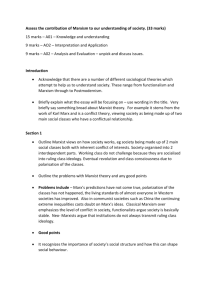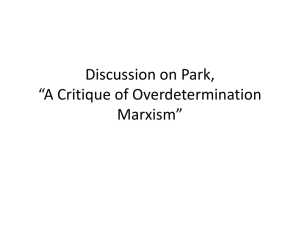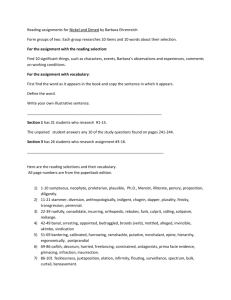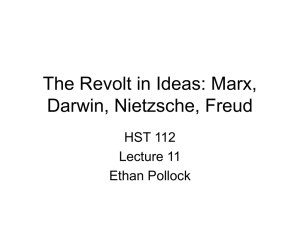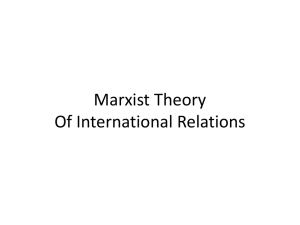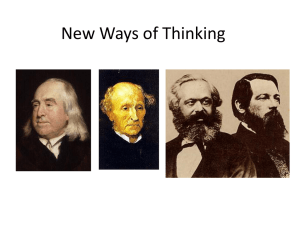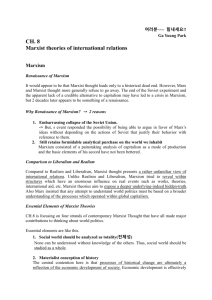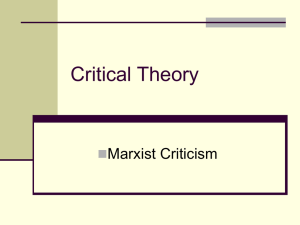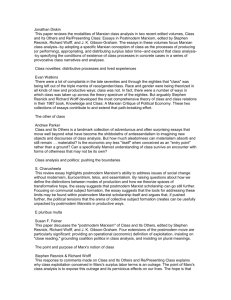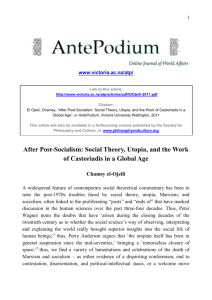I: CONTEMPORARY MOVEMENTS (= 2 papers)
advertisement
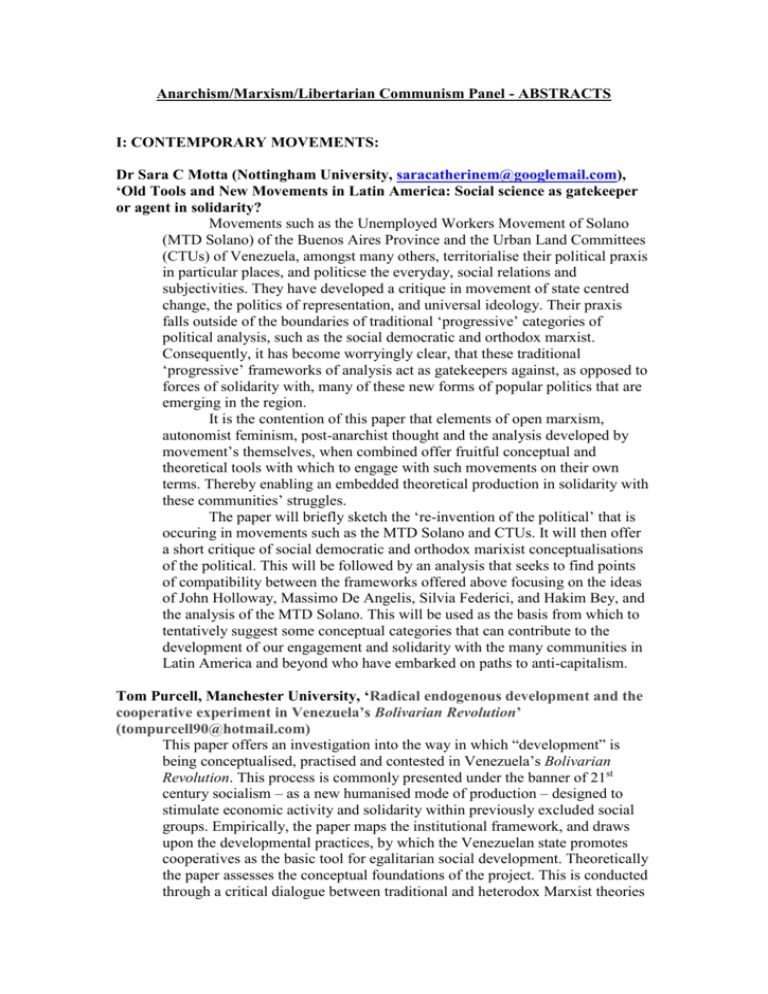
Anarchism/Marxism/Libertarian Communism Panel - ABSTRACTS I: CONTEMPORARY MOVEMENTS: Dr Sara C Motta (Nottingham University, saracatherinem@googlemail.com), ‘Old Tools and New Movements in Latin America: Social science as gatekeeper or agent in solidarity? Movements such as the Unemployed Workers Movement of Solano (MTD Solano) of the Buenos Aires Province and the Urban Land Committees (CTUs) of Venezuela, amongst many others, territorialise their political praxis in particular places, and politicse the everyday, social relations and subjectivities. They have developed a critique in movement of state centred change, the politics of representation, and universal ideology. Their praxis falls outside of the boundaries of traditional ‘progressive’ categories of political analysis, such as the social democratic and orthodox marxist. Consequently, it has become worryingly clear, that these traditional ‘progressive’ frameworks of analysis act as gatekeepers against, as opposed to forces of solidarity with, many of these new forms of popular politics that are emerging in the region. It is the contention of this paper that elements of open marxism, autonomist feminism, post-anarchist thought and the analysis developed by movement’s themselves, when combined offer fruitful conceptual and theoretical tools with which to engage with such movements on their own terms. Thereby enabling an embedded theoretical production in solidarity with these communities’ struggles. The paper will briefly sketch the ‘re-invention of the political’ that is occuring in movements such as the MTD Solano and CTUs. It will then offer a short critique of social democratic and orthodox marixist conceptualisations of the political. This will be followed by an analysis that seeks to find points of compatibility between the frameworks offered above focusing on the ideas of John Holloway, Massimo De Angelis, Silvia Federici, and Hakim Bey, and the analysis of the MTD Solano. This will be used as the basis from which to tentatively suggest some conceptual categories that can contribute to the development of our engagement and solidarity with the many communities in Latin America and beyond who have embarked on paths to anti-capitalism. Tom Purcell, Manchester University, ‘Radical endogenous development and the cooperative experiment in Venezuela’s Bolivarian Revolution’ (tompurcell90@hotmail.com) This paper offers an investigation into the way in which “development” is being conceptualised, practised and contested in Venezuela’s Bolivarian Revolution. This process is commonly presented under the banner of 21st century socialism – as a new humanised mode of production – designed to stimulate economic activity and solidarity within previously excluded social groups. Empirically, the paper maps the institutional framework, and draws upon the developmental practices, by which the Venezuelan state promotes cooperatives as the basic tool for egalitarian social development. Theoretically the paper assesses the conceptual foundations of the project. This is conducted through a critical dialogue between traditional and heterodox Marxist theories of the state. This refers to two ultimately incommensurable positions, the former seek to uphold the transformative powers of a revolutionary state, whereas the latter maintain that, the state can only be understood as an expression of the capitalist mode of production. Through an integration of the empirical and theoretical content, the paper argues that, whilst the cooperative phenomenon can be understood as a sui generis mode of capitalist development, it nevertheless, presages the intensification of struggle over the political and economic direction of the Bolivarian Revolution. II: HISTORICAL MOVEMENTS: Andrej Grubacic, (Fernand Braudel Center at SUNY Binghamton, balkanozapatista@gmail.com) and/or Staughton Lynd (independent; radical historian and labor lawyer) "Haymarket synthesis: Chicago Anarchists, Wobblies and the Zapatistas". Chris Ealham (Honorary Research Fellow, University of Lancaster; c.ealham@lancaster.ac.uk or chris_ealham@hotmail.com), ‘"The Path to Follow"? Distinct responses to the Russian Revolution within the Spanish anarcho-syndicalist movement.’ Immediately after the revolution, Russia was regarded by many anarchists and anarcho-syndicalists as a beacon of what was possible. Long the most vehement opponents of reformism in Spain, for many 'anti-authoritarians' the return of Marxism to its revolutionary roots was an attractive development. The pro-Bolshevik trend within the revolutionary syndicalist union, the CNT, reached its zenith at the its December 1919 Madrid congress, when the CNT affiliated provisionally to the Comintern. There then emerged a new faction within the union, the so-called 'communist-syndicalists', the most committed pro-Bolsheviks within the CNT, who were most keen to follow the Russian path. This paper will trace the rise of the 'communist-syndicalists' to the helm of the CNT, prior to an anti-Soviet backlash, which saw them first marginalised and then expelled from the union by radical anarchists, who rose within the organisation in direct proportion to the anti-Bolshevism. This paper will explore the significance of the rise of the pro-Bolshevik trend within the CNT and why it was subsequently isolated. Martin Miller (Duke University, NC; mmiller@duke.edu), ‘The Perils of Power: Anarchists in the State.’ This paper, based on research on primary materials, will focus on the debate that took place after the Bolshevik seizure of power on the participation of anarchists in an all-socialist government. Inspired by Emma Goldman’s critique of the decision of Federica Montseny to become minister of health for the republican government during the Spanish Civil War and by the fact that Goldman eventually went to Spain and ended up supporting Montseny's position as an anarchist working for the “state”, this paper looks for possible precedents in the Russian revolution where indeed there was a significant number of “Soviet anarchists” in 1918-19. The debates that took place in Russia and Spain are critical since they are among the few moments in the modern era when anarchists were faced with the problem of assuming the actual responsibilities of state authority. III: UNORTHODOX MARXISMS: Patrick Baud (independent researcher; patrickfbaud@gmail.com), ‘Reductionist Misreadings of Althusser in Richard Day and Saul Newman's Postanarchism(s)’ (patrickfbaud@gmail.com) The classic anarchist claim about Marxists since the schism after the First International is that Marxists are authoritarian statists. Despite their differences with classical anarchists, postanarchists, such as Richard Day and Saul Newman, continue to make this claim. As a result, it is Marxists, not anarchists who are most often blamed for the irreconcilability of their political and theoretical positions. However, in their zeal to present themselves as the gurus of contemporary radical politics, particularly of the so-called "antiglobalization" movement, postanarchists have come to depend on these hyperbolic claims to the point where it disables them from engaging themselves in any substantial sense with those contemporary Marxisms which have distanced themselves from authoritarian politics. In particular, Marxist theorists seen as "orthodox" such as Louis Althusser suffer most by this approach. It is because of how strongly postanarchists hold this claim rather than because of the inviability of Marxist theory that intersections between contemporary anarchisms and Marxisms are rare. Instead, I suggest another potential reading of Althusserian theory which remains committed both to Marxist theory but also to postanarchist positions. Drawing on Geraldine Friedman and Ellen Rooney's studies on Althusser's theories of reading and the symptom, I develop an approach which allows for the development of certain themes in some of Althusser's later autocritiques, in particular his nonessentialist redefinition of the theory of ideology and his elaboration of nondialectical determination through his theory of overdetermination. This approach holds the potential to drive a reevaluation of the Althusserian legacy and the implications of Althusserian thought not only for postanarchist theory but for radical politics today. Simon Boxley (University of Winchester), ‘Red, Black and Green: Dietzgen's Philosophy Across the Divide’ (Simon.Boxley@winchester.ac.uk). What little has been written about Joseph Dietzgen as a theorist sympathetic to both emergent Marxist and Anarchist traditions has focussed on his political interventions of the 1880s. It is argued here that in Dietzgen's philosophical monism, it is also possible to find an account of thought as positioned material movement within context which both underpins a radical politics of selfemancipation, and prefigures ecosophical conceptions of natural interrelatedness. In this respect, Dietzgen represents a forgotten opportunity to develop a worldview or "world-consciousness" which crosses red-black-green divides. It is argued in this paper that there is much to be retrieved from this 'lost' thinker which might inform contemporary radical philosophical reconciliation even between advocates of deep green (and primitivist) thought and some Marxist currents. Christos Memos (University of York, cm193@york.ac.uk), ‘The concept of Technique in Marx: Rethinking Castoriadis`s Critique’ Castoriadis started his critique of orthodox Marxism as an immanent critique and defended Marx against his orthodox interpretations and distortions. Later on, he shifted from a critique of Marxism to a critique of Marx’s own thought in an attempt to trace its metaphysical and problematic elements that could be regarded as responsible for the decay of Marxism and its reduction to an obstacle for the revolutionary theory and practice. This paper reassesses Castoriadis`s analysis of Marx’s notion of technique and argues that despite its merits, Castoriadis espoused an orthodox Marxist analytical framework and did not take into account the ensemble of Marx’s works. Firstly, it aims at outlining Castoriadis`s positions according to which Marx never questioned the pseudo-rationality of the capitalist technique and the organization of the capitalist production. Marx was deeply immersed in the capitalist imaginary and did not realize that there is neither autonomy nor neutrality of the capitalist technique. Hence, Marx was led to a ‘metaphysics of technique’ and on this basis he formulated his philosophy of history and his analysis of the dialectics of capitalism. Further, the paper reconsiders Castoriadis`s critique and argues that he made no distinction between Marx and the economistic or technicist interpretations of orthodox Marxism. Castoriadis neglected Marx’s views expressed in Capital and he rather was more interested in expressing his opposition to Marxism by reading Marx, however, through the lens of orthodox Marxism, that is, by using the ‘base-superstructure’ metaphor. Finally, it will be concluded that some aspects of Castoriadis`s insights about the concept of technique could serve as a useful point of reference in our struggle for a radical transformation of society. IV: THE IDEA OF A ‘LIBERTARIAN COMMUNISM’: Trevor Bark (Capital & Class, Mayday; dr_trevorbark@fastmail.net), ‘Anarchist Sterility, Just like Marxist sterility’ There are many political problems with the Anarchist and Marxist milieus. There is a dialectic of organisation and spontaneity amongst some groups from both traditions too, but some are so bureaucratic there is no relationship between theory and practice. The ‘call for papers on Libertarian Communism’ suffers from similar problems (also present in websites such as Libcom), which chiefly consists of intellectual and historical reductionism. This paper will identify problems with the Left Communist and anarcho-communist traditions, and suggest that other theorists, notably from the New Left (the British Marxist Historians), are very relevant to discussions. Which despite being important in British history are, for unknown reasons, kept out of libertarian communist theory and history. Saku Pinta (Loughborough University, S.A.M.Pinta@lboro.ac.uk, ‘Being common without being ordinary: The political theory of Libertarian Communism’
